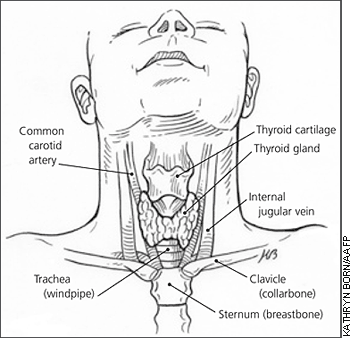
Am Fam Physician. 2005;72(4):635-636
See related article on hyperthyroidism.
What is hyperthyroidism?
Hyperthyroidism (say: hi-per-THI-royd-iz-um) is when you have an overactive thyroid. The thyroid is a gland in your neck (see the figure). It makes a hormone that helps your body’s metabolism (the way your body uses food and energy). An overactive thyroid can cause weight loss, nervous feelings, shakiness, a fast heartbeat, and other problems. If hyperthyroidism is not treated, it can hurt your bones and heart and cause other health problems.

How is hyperthyroidism treated?
The best treatment for hyperthyroidism depends on the cause of your hyperthyroidism, your age, the size of your thyroid gland, and your general health. You and your doctor can choose the best treatment for you.
•Beta blockers. Medicines called beta blockers can help if you have the shakes or a fast heartbeat. Beta blockers may be the only medicine you need if you have thyroiditis (say: thiroyd-EYE-tis) because this disease usually goes away on its own. You may not be able to take a beta blocker if you have heart or lung problems.
•Radioactive iodine. Radioactive iodine (RAI) therapy is the most common treatment for hyperthyroidism. It works well and is safe. It will not make you more likely to get cancer or stop you from having children. But you should not use RAI if you are pregnant or breastfeeding. You should wait to get pregnant for six months after the treatment. If you are taking any medicine, tell your doctor right away because some medicines must be stopped before you have RAI. For about three days after treatment, you should double flush the toilet and wash your hands a lot. This will stop radiation in your body from affecting others. You also should not have close contact with young children and pregnant women during this time.
•Antithyroid drugs. Antithyroid drugs (ATDs) stop the thyroid gland from making hormones. ATDs are used in children, pregnant women, and people who do not want RAI therapy. Two ATDs available in this country are methimazole (say: meth-IM-ah-zole) (brand name: Tapazole) and propylthiouracil (say: pro-pil-thy-o-YOOR-a-sil). Methimazole is used most often because it is easier to take and causes fewer side effects. Propylthiouracil is safer in pregnancy and during breastfeeding. Talk to your doctor right away if you get a bad sore throat, a high fever, or yellowing of the skin when taking an ATD. ATDs work for most people and are less likely to cause an underactive thyroid gland than RAI therapy. However, there is a chance that your hyperthyroidism will return after the medicine is stopped, especially if you smoke or have a very large thyroid gland.
•Surgery. Surgery may be an option if you have a very large thyroid gland that is pressing on other parts of your neck or if you are pregnant and cannot use ATDs. Surgery costs more and is riskier than the other treatments. Surgery usually cures hyperthyroidism but causes an underactive gland in some patients.
How long until I am cured?
Your doctor will need to check your thyroid regularly for the rest of your life to be sure your hyperthyroidism does not come back. If you get an underactive thyroid gland after treatment, and are taking thyroid hormone, you still need to be watched closely.